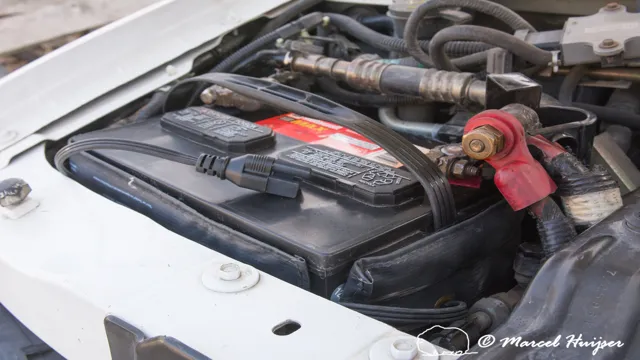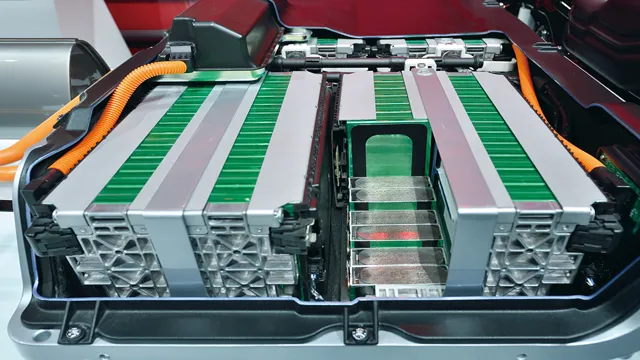Exploring the Risks and Realities of Electric Car Battery Fires
Electric cars are slowly but surely replacing traditional gas guzzlers on the roads. With zero emissions and greater fuel efficiency, electric cars are not just an environmental choice, they’re also a feasible and financially-savvy option. However, despite the numerous benefits, electric car batteries have been a source of concern for many due to the risk of fire.
Yes, that’s right- electric car batteries can catch fire. The question is why? How often does this occur? And, most importantly, should electric car owners be worried about the possibility of their vehicles going up in flames?
Statistics on Electric Car Battery Fires
Electric car batteries have become increasingly popular due to their efficiency, cost-effectiveness, and eco-friendly features. However, there have been concerns regarding electric car batteries catching fire, leading to questions about their safety. According to statistics, electric car batteries catching fire is a rare occurrence.
In fact, a recent study found that the rate of EV battery fires is just one-twenty-fifth that of traditional gas cars. Electric car manufacturers are also taking proactive steps to minimize the risk of battery fires, such as including battery management systems that monitor and regulate the battery’s temperature and voltage. Despite these efforts, accidents can happen, and it’s essential to take precautions such as monitoring battery usage and ensuring proper maintenance.
Ultimately, the benefits of electric car batteries far outweigh the risks, making them a worthy investment for anyone who wants to reduce their carbon footprint while enjoying a smooth driving experience.
Recent Incidents and Causes
Electric car battery fires have been a cause for concern among drivers and manufacturers alike. According to recent statistics, the incidence of battery fires in electric cars is much lower than in traditional gasoline cars. In fact, electric cars are less likely to go up in flames than their gasoline counterparts.
This is due, in part, to the fact that electric car batteries are more stable and have more safety features built in. However, electric car battery fires can still occur due to a variety of reasons, such as overheating, manufacturing defects, or accidents. While these incidents are rare, it is important for owners of electric cars to keep their vehicles properly maintained and follow safety guidelines to minimize the risk of any accidents.

Comparative Analysis on Li-Ion vs Traditional Car Batteries
Electric car battery fires have been a widespread concern for years. According to statistics, traditional gasoline-powered cars have a fire rate of 1 in every 20 million vehicles, while electric cars have a fire rate of 1 in every 10,000 vehicles. However, despite the lower fire rate, electric car battery fires can be more dangerous due to the advanced technology used in them.
Lithium-ion batteries, which are commonly used in electric cars, can catch fire without warning and cause a chain reaction of thermal runaway. This is because lithium-ion batteries are made up of combustible materials that can react unpredictably when they are damaged, overheated, or overcharged. In comparison, traditional car batteries (lead-acid batteries) are less prone to catching fire, but they can still explode if not handled properly.
Therefore, it’s essential to handle both types of batteries with caution to avoid any potential risks.
Safety Measures and Precautions
Electric car batteries are powerful sources of energy that can be prone to overheating or catching fire if not handled properly. To avoid any incidents, electric vehicle owners need to regularly check their battery packs for any signs of damage or malfunction. In addition, it’s essential to keep the batteries cool and prevent them from getting too hot.
One way to do this is by regularly monitoring their temperature and charging them at a slower rate. Furthermore, it’s important to have a fire extinguisher that is specially designed for extinguishing electric vehicle fires. These extinguishers use a non-conductive solution that won’t short-circuit the battery and create a larger problem.
With these safety measures and precautions in place, electric vehicle owners can feel more confident in the safety of their vehicle and avoid any potential hazards associated with electric car batteries catching on fire.
Emergency Response Plan for Electric Car Battery Fires
The rise in electric-powered cars has brought up safety concerns regarding battery fires, which require emergency response plans in case of accidents. Car manufacturers and emergency responders alike recommend safety measures and precautions to ensure safety in these incidents. These precautions include wearing protective gear, evacuating the area, and ensuring a safe distance from the car in question.
It is also essential to turn off the power source to prevent further damage or ignition. Furthermore, ventilating the area can prevent the accumulation of toxic fumes that could be harmful to human health. Battery fires are highly complex and unpredictable, which makes them challenging to manage.
However, responders can use foam or water with electrolyte-compatible extinguishers to douse the flames. It’s critical to realize that responding to electric car battery fires requires highly trained and specialized personnel to ensure safety efficiently.
Safety Features on Electric Cars to Prevent Fires
Electric cars are a relatively new invention, and as with any innovative technology, safety is a top priority. Electric car manufacturers have taken numerous precautions to prevent fires, which can occur due to battery malfunctions or defects. One of the most common safety measures used is thermal management systems, which regulate battery temperature to prevent overheating.
In addition, manufacturers have implemented advanced monitoring systems to detect any anomalies or issues that may lead to a fire. This includes monitoring temperature levels, voltage, and electrolyte levels in real-time. In the unlikely event of a fire, electric cars also have fire suppression systems that activate automatically to extinguish the flames.
As electric car technology continues to advance, it is reassuring to know that manufacturers are constantly working to improve safety features and prevent any potential hazards.
Steps to Take to Prevent Battery Fires
Lithium-ion batteries are found in a wide range of devices we use on a daily basis. From cell phones to laptops, e-cigarettes to electric cars, these batteries provide us with a reliable power source. However, these batteries can also be the cause of fires, and in some cases, explosions.
To prevent battery fires, there are a few safety measures and precautions that you can take. Firstly, never leave charging batteries unattended, especially overnight. Also, ensure that you are using the correct charger for your device, as using the wrong charger can cause overcharging and overheating.
Another crucial precaution is to never use damaged or punctured batteries, as this can expose the highly flammable electrolyte solution inside and potentially start a fire. Finally, it’s essential to store and handle batteries correctly, always separate from other metal objects or batteries, and never in high-temperature environments such as direct sunlight. By following these simple yet effective steps, you can help prevent battery fires and keep yourself and those around you safe.
Future of Electric Car Battery Fires
Electric car batteries have come under scrutiny due to their potential for fires. The good news is, with advances in technology, the risk of electric car battery fires is decreasing. Electric cars now incorporate advanced features such as cooling systems and fire-resistant materials to reduce the risk of the battery catching fire.
In addition, the batteries themselves are becoming safer and more efficient, with increased capacity and longer lifetimes. However, it’s important to remember that electric car batteries still pose a risk, and steps should be taken to minimize the risk of a fire. This includes proper maintenance and charging, avoiding extreme temperatures, and following recommended guidelines for handling the batteries.
As electric car technology continues to evolve, we can expect to see even safer and more efficient batteries that help reduce the risk of battery fires even further.
Research and Development on Battery Safety
As electric cars become more popular, battery safety is a top concern for researchers. Battery fires have been reported, and the potential for injury or damage is high. That’s why research and development on battery safety is so important if we want electric cars to become a widely used form of transportation.
The future of electric car battery fires looks hopeful, however, as scientists and engineers continue to work on improving battery technologies. This includes developing new materials that are less combustible and finding ways to prevent thermal runaway, a phenomenon that can cause a battery to quickly overheat and explode. In addition, new battery management systems are being created that can detect potential problems and take steps to prevent them.
With these advancements, the risk of electric car battery fires can be greatly reduced, making electric cars a safer and more viable option for consumers.
Innovations in Battery Design to Improve Safety
The future of electric cars is exciting, but concerns about battery fires remain. Innovations in battery design are necessary to address safety issues and restore consumer confidence. There have been some significant advances in battery design that are making electric vehicles safer.
One idea is to incorporate fire-retardant materials into the battery components to prevent or extinguish any potential fires. Another solution is to develop new cooling systems that prevent the battery from overheating, which can cause a fire. Additionally, self-healing batteries that can repair any internal damage and prevent the release of reactive materials are in development.
These advancements have the potential to significantly reduce the risk of battery fires in electric cars, making them safer and more reliable. Nonetheless, it is essential to continue to develop new technologies and continuously improve battery designs to make electric cars even safer for everyone.
Conclusion: Electric Car Battery Fire Prevention is Key
In the world of electric cars, battery fires have been a hot topic (pun intended). But let’s face it – any technology that involves high voltage and energy storage comes with risk. The good news is that electric car manufacturers have taken extensive measures to prevent and manage battery fires through advanced safety features and improvements in battery technology.
As the electric car market continues to grow and evolve, you can be sure that researchers and engineers will keep pushing the boundaries of innovation to ensure that electric vehicles remain safe and reliable for all drivers. So let’s keep the sparks flying in the right direction, shall we?”
FAQs
Can electric car batteries catch fire?
Yes, electric car batteries can catch fire if they are damaged or overheated.
What causes electric car batteries to catch fire?
Electric car batteries can catch fire due to a variety of reasons such as overcharging, punctures or damage to the battery, and manufacturing defects.
Is there any way to prevent electric car battery fires?
Yes, regular maintenance of the car and its battery is essential to prevent battery fires. It is also important to follow the manufacturer’s guidelines for charging and use.
What should I do if my electric car battery catches fire?
In case of an electric car battery fire, immediately turn off the car and evacuate. Call the emergency services and follow their instructions.





